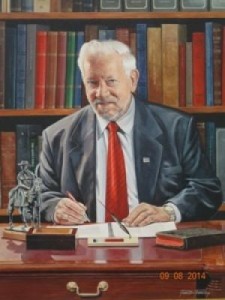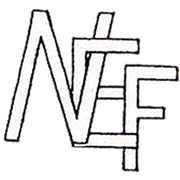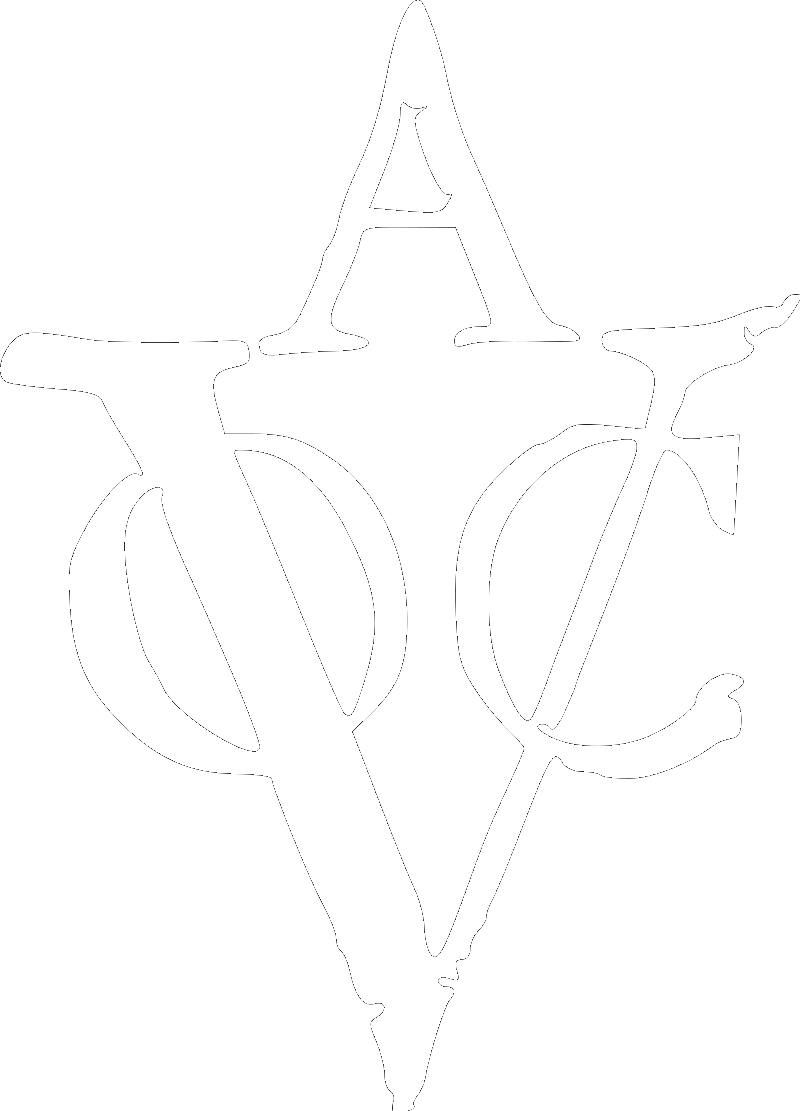Cor Frederiks
Cornelis Frederiks, who prefers to be addressed as Cor, is a down-to-earth, sprightly and quick-witted 86-year-old businessman, scholar, author, investor, art collector and company director with a flourishing accounting practice in Cleveland, a sea-side suburb of Brisbane. Cor insists he is not retired and he still attends his office from his home in nearby Thornlands every day of the week.

Cor has had a varied life including, as a young man, three years as wireless operator 2nd class in the Royal Dutch Navy during the Second World War. He started his working life in Australia as Administration Clerk with the Chief Secretary’s department in Perth, WA, in 1951, and then worked as a builders labourer and subsequently bookkeeper on a sheep station before owning and managing a one-million-acre cattle and sheep property in outback Queensland. However most of his life was focused on accounting and on the Christian faith as is evident from the title of his (1998) book The Money Bible, a guide for anyone interested in learning ‘How to Handle Financial Matters’ from a Christian perspective.
Date/place of birth: 10 November 1927, Nijmegen, Netherlands
Family: One of nine children. His father was a removalist and trader in coal and his mother died when he was eleven years old.
Arrival in Australia: Sibajak, Fremantle, 1 March 1951.
Marriage: 7 December 1954 to Pauline Elsie Paull. He married his third wife, Helene Elise Crawford (née McDougal) on 7 December 2002.
Date of naturalisation: 17 April 1956 so he could practise as public accountant
Qualifications: PARB, AAUQ, ACAA, FCIS, FTIA, FTMA, ACIM
Professional memberships: FAICD, FCPA, FIPA, ACSA, FGIA, FAIM, CTA , ICAA, JP
Cor attended the Hazenkampseweg Christian School in Nijmegen run by the Hervormde Kerk and started at the Avond Gynnasium but left school at an early age at the start of World War Two. During the depression his father used to let people have coal without paying and this generosity eventually resulted in him going out of business. This instilled in Cor a determination to never be poor and financial success was the chief motivator of his working life since childhood. However, this was not at the expense of his Christian faith or of a deep and abiding commitment to the Reformed Church, the Dutch community and the Haggai Institute. This institute was founded by Dr John Edmond Haggai in the US and now operates world-wide for the purpose of training and educating third world leaders in evangelising their communities.
Cor likes to remind people that he shares a birthday with Martin Luther (10 November 1483) and, being brought up in a Protestant household in one of the most Catholic cities in the Netherlands, he experienced religious conflict from an early age. This made him all the more determined to encourage religious tolerance and the ecumenical movement in Christianity. In this he is faithful to one of the most enduring values of his Dutch heritage.
Cor has also seen the darker side of religion. In his book, The Money Bible, he recounts a school experience when he was twelve years old. One day the Christian teacher asked each student to purchase an atlas at a cost of 1.75 guilders. Cor’s father was by then a widower with nine children and did not have that kind of money so Cor handed over the ten cents he earned every Saturday for looking after the family vegetable garden, explaining that it would take him 17 weeks to pay for the atlas whereupon the teacher loudly explained to the whole class that Cor would be paying ten cents every Monday. Predictably, the whole class burst out laughing. For seventeen Monday mornings, Cor had to ceremoniously hand over his ten cents while the teacher loudly announced to the class the balance still owing — to further laughter by the other students. Cor decided there and then that he would never again be so humiliated and acknowledged that “this experience has had a major impact on my life and vision for personal and financial success”.
However, that was not the end of the story for, according to Cor, it took him 35 years to learn from this experience. Telling his story to a Christian Business Convention as an adult many years later, he suddenly realised that his traumatic classroom experience, rather than causing 35 years of resentment as it had done, should have been seen by him as a privilege and a gift from God so that he would learn ‘Tenacity, Drive, Willpower and Initiative’. This neatly sums up not only Cor’s career but the driving forces of his life. It also, incidentally, goes to the roots of this attitude in the history and culture of the Netherlands as shown in the words Je Maintiendrai on our national coat of arms, or in the words Luctor et Emergo on that of Zeeland.
Commerce runs in Cor’s family, as it does in so many Dutch families. Mention has already been made of his father’s occupation as a removalist and trader in coal but Cor proudly tells the story of his uncle, Hendrik Simon Frederiks. Hendrik was the youngest of 12 children, who did very well in transport, as illustrated in a book published in 2013 to mark the ninetieth anniversary of the company he founded. Hendrik’s son, Simon, Cor’s cousin, had his 80th birthday in February 2013, longevity being another Dutch characteristic. In 2010 the company owned 500 trucks and 600 trailers, employed over 1,000 permanent drivers and many more part-time drivers. It had branches in seven countries and an annual turnover of €160 million, making it the fourth largest business of its kind in Europe. The company is currently run by the third Simon, grandson of the founder, who still provides the same commercial leadership. These leadership qualities are also shown by Cor in his career as a professional accountant.
Cor arrived in Perth in 1951 as a 23 year old and, in common with many of his generation of migrants, never lost his Dutch language. He has only the barest trace of an accent. His first wife was of Scottish ancestry as were both his second and third wives, thus maintaining the Dutch Australian tradition of exogamous marriage but, in contrast with many Dutch Australians of younger generations, he maintains strong connections with the Dutch community in Australia as well as with his family in the Netherlands. He has travelled the world, making twelve international trips since 1981, and revisited his homeland a number of times. Loyalty to his heritage combined with the cosmopolitanism of many Dutch migrants as noted by some researchers.
From 1994 to 2002 Cor was Honorary Secretary-Treasurer of the Prins Willem Alexander Retirement Village in Birkdale, Brisbane. In 1999, he helped to raise over $6,000,000 for stage two of the Village which consisted in the addition of a nursing home. Furthermore, he was Treasurer of Hollandia Soccer Club and for many years Honorary Auditor of the Dutch Club NAQ in Richlands, Brisbane. In 2001 he joined Het Borreltje, a club of Dutch-born businessmen who meet once a month at Café Oud Rijswijk in Forestdale. Its members are still able to converse in Dutch and always keen to keep some of the Dutch traditions such as “gezellig met elkaar nederlands praten en lekker hollands eten” (paling, boerenkool, erwtensoep) whilst consuming a borreltje of jenever. Forestdale is a leafy outer suburb of Brisbane noted for its substantial homes on large plots of land. The Café adjoins one of these homes and is well-appointed. It has a bar and dining area, an excellent collection of original Dutch paintings, a full-size billiard table and good presentation facilities – “een gezellige plaats”!
Cor, in his pro-bono support of the Dutch aged-care facility in Birkdale, is continuing a family tradition. His grandmother on his mother’s side, Cornelia Van’t Lindenhout (after whom Cor was named) had a relative who, in 1867, donated a large tract of land and the first building for a weesinrichting called Neerbosch, which is the largest orphanage in the Netherlands and is still in operation.
Cor is very proud of the achievements of his 13 grandchildren. At the time of writing, nine had completed University, two with a PhD, four with a Masters Degree, one with three different degrees and one with two degrees—in areas such as law, Japanese, psychology, information technology, education and medicine. He himself has an impressive list of academic and professional achievements to his name. He initially arrived in Australia to study theology at the University of Western Australia (UWA) in Perth and obtained his first university qualification in accountancy from the University of Queensland in Brisbane in 1959, having already gained a Certificate as a Qualified Accountant and becoming an Associate of the Society of Accountants in the same year. He gained over 20 qualifications and professional memberships since 1959 and continued to pursue studies and to update his qualifications into old age. At the time of writing, he was completing a Diploma in Financial Planning. Cor was a life-long learner, and in his book, The Money Bible, he strongly advised everyone to be the same. In this as in other things, he practises what he preaches.
Cor is a Member of the Australian Society of Certified Practising Accountants and of the National Institute of Accountants; an Associate of Accountancy University of Queensland, of the Chartered Institute of Secretaries, of the Institute of Corporate Managers, Secretaries and Administrators, of the Society of Accountants, and of the Institute of Cost Accountants; a Fellow of the Institute of Public Accountants, of the Association of Taxation and Management Accountants, of the Taxation Institute of Australia, of the Australian Institute of Management, and a Foundation Fellow of the Australian Institute of Company Directors. He is also a JP (Qual).
Cor’s pride and joy is his art gallery, Brisbane Galleries. He has been collecting art and supporting young artists for over 45 years. In 1987, he sponsored four artists – Dennis Harry, Peter Lawson (grandnephew of Henry Lawson, the Australian poet), Tom McCawley and David Babcock – to go to Kakadu on a creative working expedition. This resulted in more than 120 paintings which were later on display in the Cairns Art Gallery. In return for his sponsorship, Cor had first option on purchasing the paintings and he took ninety of the paintings (well over $200,000 worth) to Brisbane for the re-opening of the Brisbane Galleries.
Eighty of the paintings from this collection were sold in 1988-1990, leaving ten to be retained by Cor in his private collection. Cor’s art gallery has been closed except for sponsoring a new artist – Russell R. Kereama – whose work has featured on Channel 74 – 4ME and sixty of whose paintings are currently for sale at the Brisbane Galleries. The last showing before that was held in 2009, when 50 paintings worth $150,000 were sold in two days.
Apart from financial success, Cor’s prime motivator is his commitment to Evangelical Christianity. This is reflected in the title of his book which is dedicated to Dr John Haggai and in his work with the Haggai Institute. Cor met Dr Haggai in 1974 not long after he set up his accountancy business and he became a sponsor in 1976. He was Chairman of Haggai Institute Australia Ltdfrom 1976 to 1978. During the period 1978-1988, Cor was a sponsor of the Institute, donating in excess of $100,000. He was CEO from 1988 to 1991, working full time and without remuneration. It took him three years to transfer the administration of the Institute from Australia to Singapore. He continued to be a member of the Institute and Dr John Haggai regularly kept in touch with him by phone and by personal monthly notes, which were distributed to only a few people. He estimated that since 1991 he has donated in excess of a further $50,000 to the Institute. He also has attended international Conferences of the Institute in England, the US and Singapore. In addition, he helped to establish the Reformed Church in Queensland in 1954 as well as the Ormiston Reformed Church in 1972. For more than ten years, Cor has been, and still is currently, honorary Treasurer of the Christian Business Network as well as of four other organisations, reflecting his twin interests in financial and religious practice, in the Dutch protestant tradition, and his firm belief that these are not only ethically compatible but that they can be mutually supportive of a rich and fulfilling life.
On a more personal note, Cor has had his share of grief and misfortune, losing his wife of fifteen years to myeloid leukaemia in 1970 and being left to bring up a family of five children on his own, the youngest only three years old. His second marriage produced another child but ended in divorce five years later. He is currently happily married to Helene whom he married in December 2002. Mention has been made of Cor losing his mother at the age of eleven. None of this however has dented his rock-solid faith – so much part of the history of the Netherlands not only at home but abroad in the US, in Canada, in South Africa, in New Zealand and in Australia.
Although Cor’s encounter with formal schooling had many negative aspects, the influence of one fondly-remembered headmaster left a deep impression. This teacher helped Cor to develop an interest in poetry and Cor continued to recite poem after poem in their original, quaint 19th century Dutch dialect. One poem in particular is a poem by the title of Moederke, which is reprinted below from Cor’s transcription. Hearing Cor recite this poem one can still feel, after more than seventy years, the profound effect on him of his mother’s death—the unbearable loss still echoing in a voice too old for tears. It is a deeply moving experience for those privileged to be present.
MOEDERKE
T’en is van u hier Nederwaard
Geschildered of geschreven
Mijn moederke, geen deeltenis
Geen beeld van u gebleven
Geen tekening geen lichtdrukmaal
Geen bijtelwerk van steene
Tenzij dat beeld in mij
Dat gij gelaten hebt alene
O moge ik u onweerdig
Ooit die beeltenis bederven
Maar eenzaam laten leven in mij
Eerzaam in mij sterven
—Guido Gezelle (1830-1899)
Cor was granted Dutch citizenship on 25 June 2013 in the presence of HRH Jaime De Bourbon Parme, son of Princess Irene of Orange-Nassau. After the swearing of the oath, the Consul of the Netherlands in Brisbane, Captain Kasper Kuiper, knowing of Cor’s love of poetry, asked Cor if he would like to recite a Dutch poem for His Royal Highness. The poem he chose was Snoepwinkeltje.
The text below was transcribed from an oral presentation by Cor, since a published copy could not be located and a search for the author proved unsuccessful.
‘t SNOEPWINKELTJE
In een donkere straat
Waar het belletje gaat
Kiets het deurtje
Al rinkelend open
Komen in ‘t kamertje klein
Bij het lampengeschein
Kleutertjes binnen geslopen
En een dappere vent
In zijn vuistje een cent
Stapt naar voor
En blijft grinnikend zwijgen
Tot de koopvrouw geleerd
Zijn fortuin inspecteert
En verteld wat hij daarvoor kan krijgen
‘t Is een reep zwarte drop
Koek met suiker der op
Een kleurbal, een zuurbal, een wavel
Een zoethouten stock en een kleurige blok
Ligt alles bijheen op de tafel
Als de kapitalist zich wat dikwijls vergist
De koek met zijn vingers verkruimelt
Schelt de juffrouw verwoest
Dat hij het kostelijke goed
Met zijn viese vingers verduimelt
De kleuter verbaast dat de juffrouw zo raast
Smoest stiekum wat met zijn cornuiten
De zuurbal gehaald de kleurbal betaald
Dan schooien ze slenterend naar buiten
In de donkere straat
Waar het troepje nu gaat
Word hevig gewicht een gewogen
Dan zuigen ze om beurt
Tot de bal is verkleurd
En hun rijkdom illusies vervlogen.
—Author unknown
Reflecting on what it means to be Dutch in Australia, Cor is, as can be expected, very aware of the significance of memory in giving one’s life shape and meaning. His war-time recollections are sharp and vivid, as they are for all of us who lived through those years, even if at a younger age than Cor. But Cor can also see the possibility of the collective memories of people altering the shape and meaning of a community’s life. He has some hope that such characteristics are transmitted – for instance the lackadaisical “she’ll be right, mate” attitude common in Australia – might in time be modified by different attitudes formed in other places and times. He sees these ‘imported’ attitudes as being able to be applied to current circumstances, thereby providing a fresh and perhaps more productive approach to solving the problems of today.
Cor’s career in accountancy and bookkeeping started with his first job as a bookkeeper for a sheep property in Cunnamulla, Queensland, in 1953/54. From there he had a series of accounting jobs in Brisbane, working for a range of companies over a period of twenty years. He set up his own public accounting business in 1970 as C. Frederiks and Associates Pty Ltd. changing this in 2003 to Frederiks Accountants Pty Ltd. Currently the company employs eighteen staff, including eight qualified accountants with expertise in corporate legislation and self-managed super funds as well as supporting staff. The business has an annual turn-over in excess of $2 million. Over the years the Cor Frederiks companies have been involved in developing and owning four shopping centres, with over 60 shops, and eight factories. In the 1980s one of these companies – Frederiks Realty Pty Ltd – owned a one-million-acre cattle and sheep property west of Longreach called Vergemont Station. For ten years it was operated and managed by Cor himself as a country resort and he nominates this as one of the highlights of his working life. A brief introduction to the property as it was then is given in the ‘box’ below. During this time, Cor was also involved with The Hall of Fame.
As part of managing his property, Cor learned to fly an ultralight plane, a fixed wing Cessna 182, which he still owns, and a Robinson R22 helicopter. He has accumulated over 1500 flying hours and nominates this as one of the other highlights of all his experiences in a very full life.
VERGEMONT STATION COUNTRY RESORT
(As it was under Cor’s management in the 1980s.)
Vergemont Station, 145 km west of Longreach in Queensland, is one of the last great frontiers of the world. The property was once on the shore of an ancient inland sea and many fossils can be found, including those of Dinosaurs. Opal-bearing ranges are located nearby, yielding high grade opals and north of the property is the abandoned town of Opalton. There are ancient Aboriginal “Bora” grounds and many water holes.
First settled over a century ago, the property currently grazes both cattle and sheep.
The station is connected to Longreach by an all-weather road and has two airstrips.
There is permanent accommodation and there are caravan and camping facilities.
The activities that can be participated in include – opal fossicking, fishing, swimming, horse riding, pig hunting, trail rides, a wildlife safari, indoor games, mustering cattle,
tennis, including night tennis, bbqs and picnics as well as guided tours.
Tariffs [NB 1980 prices, taken from an illustrated brochure]
- Fully catered programme (per adult): $250 per week/ $40 per day
- Accommodation only (per adult): $100 per week/ $20 per day
- Camping/caravan site: $25 per week
Cor’s business philosophy is set out in his book, The Money Bible. He sums it up as: maximising people’s potential, improving people’s quality of life for the future, teaching the importance of using money wisely and realising that “it is better to give than to receive”. His two pieces of business advice are – “what the mind can believe and conceive, it can and will achieve”, and – “help others to better themselves in all walks of life”. These reflect the cornerstones of Cor’s philosophy – a belief in self-reliance balanced by a belief in having a social conscience. These essentially egalitarian and democratic articles of faith can fairly be said to have deep roots in Dutch history, culture and society.
- Oral history interview: Martien Jansen in de Wal and Cor Frederiks, 2014.
- Funded: Your Community Heritage Grants, The Department of the Environment, Canberra.
- Interview Series 2014: organised by Dr Nonja Peters, History of Migration Experiences (HOME), Curtin University, Perth Western Australia.






















